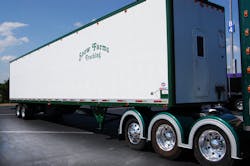Managers: Daniel & Phyllis Snow
Title: Owners
Fleet: Snow Trucking, Harrison, AR
Operation: Long-haul, dry van truckload
Problem:
Extended downtime for repairs is anathema for any trucking operation, large or small, but it’s particularly tough for owner-operators as their vehicle literally doubles as their second home when on the road.
Daniel and Phyllis Snow know this better than anyone as they were back home in Arkansas just 13 days in 2013, having spent the rest of the time out on the road in their super-sleeper-equipped 1996 Classic XL Freightliner nicknamed “The Goose.”
While raising a family of five (four boys and a girl), Daniel Snow stayed close to home, running regional and local freight as well as farming, naming the family business of seven trucks Snow Farms Trucking.
Yet with the kids grown, Daniel and Phyllis decided to cut loose and hit the highway, renaming their operation Snow Trucking and shrinking their fleet down to just “The Goose.”
But keeping their truck, which has almost 1.8 million mi. on the odometer with an engine rebuilt at the 1.5 million mi. mark, up and running isn’t easy. Neither Daniel nor Phyllis wanted to spend a lot of time searching dealerships and truck stops for the everyday wear-and-tear parts a big rig needs—from marker lights to windshield wiper blades.
Solution:
Though they initially hauled a lot of livestock, the Snows switched to a van trailer when they set out as a husband and wife team nearly a decade ago.
Space on a highway tractor is a precious commodity, so finding places to store regular maintenance items and keeping those items within easy reach proved difficult. Also, when you live out of a tractor, space is needed to store foodstuffs necessary for making those good “sleeper-cooked” meals.
At first, the Snows thought about installing storage boxes underneath the trailer to carry spare parts and such. “But we discovered that not only are they expensive, we’d have to do a lot of bending and stooping to access them; that would get uncomfortable quickly,” Daniel says.
After years of hauling cargo, it came to him that the trailer rarely ran fully loaded lengthwise—usually leaving about three or so feet to spare at the rear—regardless of what was being hauled.
So Daniel came up with an idea to relocate that “dead space” to the front of the trailer. His solution was to create a storage area separated from the cargo area with a wall and line it with shelves to store parts and whatever other supplies might be needed. He could then cut a doorway into the nose of the trailer so both he and Phyllis could quickly access it from the back door of their sleeper.
First, though, he tested the idea for several months, placing a “dummy wall” in the nose area of the trailer to see if shaving that cargo space off would impact the ability to haul full loads. After several runs, the Snows realized it didn’t affect their ability to haul freight whatsoever so Daniel immediately went to work on his idea.
After cutting a doorway in the nose of the trailer, he installed a permanent dividing wall carving out 3 ft. of space within the trailer. He then built deep wooden shelves that are almost like bins that reach all the way to the trailer’s ceiling. That way, parts and supplies placed within the bins could be easily secured and not rattle around when the tractor-trailer hit the road.
A recreational camper door created a weather-tight seal for the opening to the trailer storage area while allowing for easy egress and exit. All told, the “shop in the trailer” project cost the Snows only about $300 to construct, a price that included the camper door as well.
“We like doing things ourselves anyway and frankly, out here, you have to be able to do things yourself,” Daniel says. “Oftentimes you get into places where there’s no one but you, the truck and the road.”
About the Author
Sean Kilcarr
Editor in Chief
Sean Kilcarr is a former longtime FleetOwner senior editor who wrote for the publication from 2000 to 2018. He served as editor-in-chief from 2017 to 2018.
